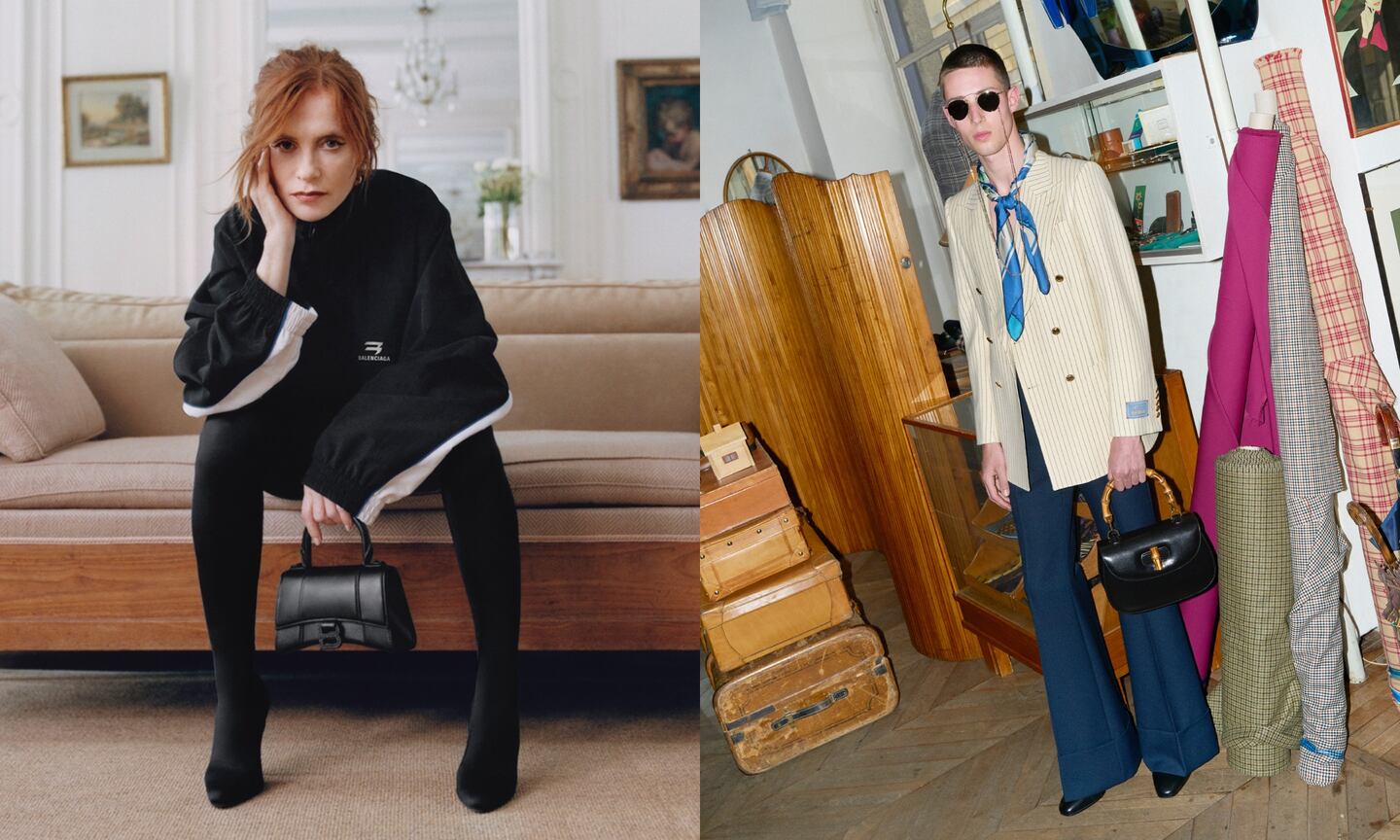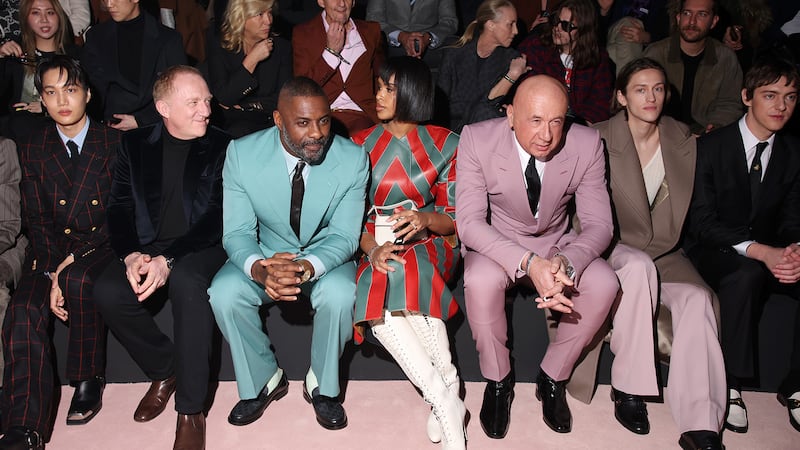
The Business of Fashion
Agenda-setting intelligence, analysis and advice for the global fashion community.

Agenda-setting intelligence, analysis and advice for the global fashion community.

Kering’s fourth-quarter sales missed estimates, falling 7 percent on an organic basis as the group took a harder hit than rivals from coronavirus disruptions in China and softening demand in the US.
The rising macroeconomic headwinds coincided with struggles specific to Kering’s brands, including a designer transition at flagship Gucci—which design star Alessandro Michele exited in November—and ongoing controversy surrounding Balenciaga, whose status as a growth engine for the group was derailed by outrage over advertisements seen as sexualising children. Fourth-quarter sales at Gucci fell 15 percent, while the “Other Houses” division that includes Balenciaga shrank 4 percent.
Even Saint Laurent, which has a lower exposure to China and has long been the company’s most consistent unit, slowed dramatically: fourth-quarter sales rose 4 percent compared to a 30-percent jump the previous quarter.
Companies across the luxury industry faced a challenging quarter last year as demand slowed in the US and Europe, where consumers have de-prioritised luxury purchases amid rising interest rates, high fuel costs and rampant inflation. In China, strict coronavirus measures hammered sales, then were suddenly relaxed, leading to soaring infection rates.
ADVERTISEMENT
Kering’s performance took a harder hit than rival luxury groups LVMH and Richemont, where sales grew 9 and 8 percent respectively last quarter, or even Burberry, which managed to eke out 1 percent growth.
Still, investors were ready to look past the struggles of the fourth-quarter, emboldened by a bullish outlook for Chinese clients, whose spending is set to rebound this year. Shares in Kering closed up 3 percent.
Chairman and CEO François-Henri Pinault cited positive meetings with Chinese authorities as well as the packed luxury malls he saw during his early February trip to the country. “It’s a very encouraging start to the year in China,” Pinault said. “I was very surprised by the level of support expressed for consumption—for quality domestic consumption—and for the private sector. The business environment is much more welcoming than it used to be.”
One exchange with Chinese authorities in Shanghai was broadcast on television, “reinforcing the will of authorities to support consumption, to support international companies,” Pinault added.
Chinese clients were the main driver of Kering’s explosive growth from 2016 until the pandemic, as the trendsetting aesthetic put in place by Gucci’s Michele seized rising demand from the country’s young shoppers, both domestically and abroad. Chinese clients were also early adopters of Balenciaga’s revamp led by Demna, snapping up early hits like Speed and Triple S sneakers.
While bursts of “revenge shopping” have made headlines during China’s intermittent loosening of restrictions since 2020, Chinese customers’ share of the luxury goods market actually fell from 33% in 2019 to 17% last year, according to consultancy Bain. The loosening of domestic restrictions and reopening of international travel could now drive a dramatic rebound.
Hopes for China’s recovery comes as business slows with US consumers, who drove growth for luxury in 2021 and 2022.
In a meeting with reporters, Pinault said Kering would maintain U.S. store expansion plans including locations in mid-sized Southern cities like Nashville and Charlotte—describing them as a long-term play.
ADVERTISEMENT
“From 2019 to 2022, our U.S. business grew 80 percent. The number of clients really grew and they remain loyal,” Pinault said. “That demand won’t go away.”
Still, as household savings bolstered by cancelled travel plans and federal “helicopter money” during the pandemic erode, the US market is “taking a breather,” chief financial officer Jean-Marc Duplaix said. “The aspirational clients in particular are sort-of taking a break,” he said.

Kering’s biggest brand Gucci has continued to grow more slowly than top rivals since the pandemic. Despite efforts to retool its merchandising with a greater focus on heritage and timeless products, reshuffle its China organisation and ramp up the rhythm of communications last year, the brand’s full-year sales rose just 1 percent, Kering said Wednesday.
Last month, Kering named a designer from Valentino’s studio, Sabato de Sarno, to succeed Michele as creative director of Gucci. De Sarno’s first show won’t happen until September, with collections arriving in stores in early 2024.
Still, Kering hopes his impact on the brand will start to be felt from the second half of this year as the designer teases his vision with capsule collections and campaigns.
“Gucci is about the balance between fashion authority and capitalising on the heritage to build the timeless component — it’s not one or the other,” Pinault said. “Sabato is very comfortable with that. He understands the necessity of having a strong fashion component, but he also has experience balancing that with [overseeing] commercial collections, with the heritage.”
While awaiting De Sarno’s debut, Kering pledged to still promote the brand with “big shows,” including studio-signed outings slated for Milan’s upcoming womenswear week and a cruise show in Seoul.
Balenciaga, too, is seeking to position itself for a rebound after sales took a severe hit after outrage over two controversial advertising campaigns sparked boycotts and protests, particularly in the key US market, where stores have been largely empty. (Celebrity spokesperson Kim Kardashian has since stopped working with the brand.)
ADVERTISEMENT
The controversy has had little impact in Asia, but the brand continues to suffer in the US and other English-speaking countries, where it “still has a big job to do restoring its image,” Pinault said.
The company defended its decision not to fire Balenciaga’s CEO Cédric Charbit or creative director Demna. “We found there was no bad intention. We believe people have the right to make mistakes—that’s important to us at Kering. Just don’t make them twice,” Pinault said.
Balenciaga stopped almost all advertising and promotions since the incident, but is preparing to return to the spotlight with a Paris Fashion Week show that will see the brand pivot away from eye-catching showmanship and focus on developing products that more obviously evoke its couture heritage.
The brand has restructured its image team as well as bringing on an outside agency to oversee communications. Kering also created a group-wide position overseeing “brand safety” in the wake of the incident.
The commercial impact of Balenciaga’s ad scandal is hoped to fade from Q2, chief financial officer Jean-Marc Duplaix said.
Last week Kering confirmed it was creating a beauty division set to bring the category in-house for some of its brands including Alexander McQueen, Bottega Veneta and Balenciaga. The licences for those labels with beauty group Coty expired last year, and were not renewed in preparation for the launch, Kering confirmed.
Kering plans to start its beauty push by launching new perfumes, as the group sees potential for synergies via advertising investments required in the category. The group is keeping its eyes open for M&A opportunities that could support the push.
Former Estée Lauder executive Raffaella Cornaggia has been named CEO of the unit, which will develop beauty for the French group’s brands, including Bottega Veneta, Balenciaga and Alexander McQueen.
Sabato De Sarno, a close associate of star designer Pierpaolo Piccioli, will succeed Alessandro Michele at the creative helm of Italy’s biggest brand.
The French brand will scale back on spectacle and focus on design after being accused of sexualising children, designer Demna told Vogue in the company’s first interview since the scandal last year.

Robert Williams is Luxury Editor at the Business of Fashion. He is based in Paris and drives BoF’s coverage of the dynamic luxury fashion sector.
Brands from Valentino to Prada and start-ups like Pulco Studios are vying to cash in on the racket sport’s aspirational aesthetic and affluent fanbase.
The fashion giant has been working with advisers to study possibilities for the Marc Jacobs brand after being approached by suitors.
A runway show at corporate headquarters underscored how the brand’s nearly decade-long quest to elevate its image — and prices — is finally paying off.
Mining company Anglo American is considering offloading its storied diamond unit. It won’t be an easy sell.